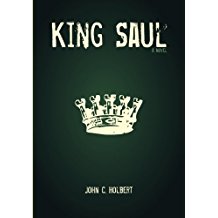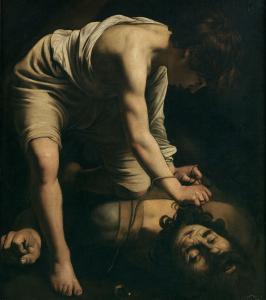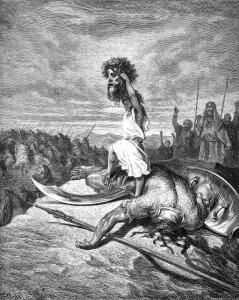 There can be no more familiar Bible tale than the one for today, the killing of the giant Goliath by the shepherd-king David. The cliché about the “surprise victory” of tiny boy defeating the hardened warrior has echoed down the centuries, used to describe sporting events and political contests alike. Yet, as usual with these fabulous Bible stories, there is far more here than meets the simplistic eye, as my storied account below tries to demonstrate.
There can be no more familiar Bible tale than the one for today, the killing of the giant Goliath by the shepherd-king David. The cliché about the “surprise victory” of tiny boy defeating the hardened warrior has echoed down the centuries, used to describe sporting events and political contests alike. Yet, as usual with these fabulous Bible stories, there is far more here than meets the simplistic eye, as my storied account below tries to demonstrate.
After the wizened Samuel left the sacrificial hill above Jesse’s farm, having absurdly crowned the shepherd David king of Israel, much to the chagrin of his dumbfounded brothers and gaping father, in less than a week, Jesse sent that same David to check on his siblings, three of whom being conscripted into Saul’s army were encamped in the valley of Elah on the east bank of a small stream while the main force of the huge Philistine force was camped on the west. But that was not the real problem for Israel. Among the Philistines was their famous champion, the giant Goliath, a nearly ten- feet tall behemoth, armed with 250 pounds of chain mail on his chest and back, a spear slightly taller than himself, topped with a sixteen pound metal head, his own head covered by a bronze helmet, his legs protected by bronze greaves, and led by a shield bearer, staggering under the weight of his massive, leather-embossed defensive shield. Though the Philistines knew the way of steel making, that day Goliath was clad only in bronze, a far softer metal, but one that caught the sun nicely and gleamed with splendor. In fact, Goliath did not expect a fight that day; he expected capitulation from the ridiculous Israelites in the face of his glory and might.
 “Send out a man to fight (if you can find a real man among you),” thundered Goliath, “man to man. Why have you drawn up for battle? Am I not a Philistine, and are you not Saul’s slaves?” he continued with contempt. “If you can find a man among you, and if he is able to defeat me (fat chance!), then we will be your slaves. But if I defeat him (which I am certain to do), and kill him (and gut him like a fish, oh delightful prospect), then you will be our slaves to do with as we will. I defy all of you today. Send out a man to fight with me!” And with those terrifying words, every last soldier of Israel rushed headlong for the safety of their tents and dove into their blankets, trembling. Some cast their eyes in the direction of Saul’s tent, their king, the tallest man in Israel, and hoped he would appear and confront the monster. But there was no sign of Saul.
“Send out a man to fight (if you can find a real man among you),” thundered Goliath, “man to man. Why have you drawn up for battle? Am I not a Philistine, and are you not Saul’s slaves?” he continued with contempt. “If you can find a man among you, and if he is able to defeat me (fat chance!), then we will be your slaves. But if I defeat him (which I am certain to do), and kill him (and gut him like a fish, oh delightful prospect), then you will be our slaves to do with as we will. I defy all of you today. Send out a man to fight with me!” And with those terrifying words, every last soldier of Israel rushed headlong for the safety of their tents and dove into their blankets, trembling. Some cast their eyes in the direction of Saul’s tent, their king, the tallest man in Israel, and hoped he would appear and confront the monster. But there was no sign of Saul.
Goliath came out morning and evening for forty consecutive days and uttered the same speech again and again for a total of 80 times. And every time, the Israelite reaction was the same—chaotic flight to safety, trembling fear, silent acceptance of ignominious shame and defeat in the face of Goliath, the unbeatable giant. One might surmise that Goliath was rather more physically endowed than mentally astute; his speech sounded painfully memorized and woodenly pronounced, but no matter; his size and strength were more than enough to cow the Israelites into inaction and terror.
But on time 81, as Goliath once again stood with one massive foot in the stream’s west course, something changed. It was a small change, but an enormously significant one. David, the shepherd from Bethlehem, entered the camp and heard Goliath’s speech for the first time. He looked at the giant and witnessed the running Israelite soldiers as they put themselves as far from Goliath as they could. And David was both surprised and ashamed for his people. Almost immediately, he asked a few soldiers what a man could expect if he was able to kill Goliath. David acted as if he knew a way to accomplish such a feat. The soldiers, gazing at the runt, chuckled and replied, “Well, if you could kill Goliath (ridiculous, they knew), you would receive riches from the king, would marry one of the king’s comely daughters, and would never pay a red cent of taxes in the land as long as you and your family lived in Israel.”
Just to make sure that he had the stakes correctly in mind, David asked a second group and a third and received the same reply. His brothers overheard the upstart and contemptuously asked what he was doing. “Where are those sheep you are supposed to watch? We know you have just come here to spy on us, to watch while we fight, to make your own position safe and comfortable!” “Well,” David answered, “why are you so upset? It was merely a question.” And with that, he turned from his brothers and asked still another group about what he might gain by killing the giant. David is acting as if the giant is already as good as dead!
And as far as David is concerned, Goliath is already dead, because David has seen the giant with very different eyes than his brothers and the rest of the army and even Saul the king. Goliath is huge, but he is also slow, weighted down with all that bronze, that gigantic spear, that enormous chain mail coat, that astonishing helmet. Speed is his problem, and David has just the sort of weapon in hand that takes full advantage of a lack of speed—he has a mobile missile launcher, his fabled sling. David was a master with his sling. He could hit a pot at 20 cubits and more, and could wound or kill any scavenging wolf before it grabbed a foolish sheep from the flock. David took one look at Goliath, and knew he could be defeated.
So, after refusing the offer of Saul’s armor, which was far too large in any case, he headed for the stream and secreted five stones in his shepherd’s bag. Goliath, incredulously, watched as the small boy moved toward him, seeing only his stature and his shepherd’s staff. “Am I am dog that you come at me with sticks?” he shouted. Goliath failed to see the seed of his doom, hidden behind David’s back, that sling. David replies with real bravado, lacing his speech with religious talk of God, a God he fully trusts. But surely, he trusts his sling just as much or more. “You have defied the armies of the living God,” he squeaks as loudly as his voice will allow, “and I will defeat you and cut off your head, so that all the earth may know that there is a God in Israel, and so that all this assembly may know that YHWH does not save by sword and spear, for the battle is YHWH’s, who will deliver you into my hand!” David is hardly speaking to Goliath; this speech is designed for both the army of the Philistines and the army of Israel. After David defeats Goliath, everyone will know of this David; Goliath is David’s meal ticket to greatness.
And so it happens. David stays out of range of Goliath’s huge spear, and at the right time hurls a stone from his sling, hitting the giant in the forehead, the only unprotected spot on his head. Goliath falls into the stream with a mighty roar and dies in a spreading pool of his own blood. David leaps onto his back, pulling the giant’s sword from its scabbard, and cuts off Goliath’s head, thrusting the grisly thing into the sky for all to see. David’s eyes are feverish with blood lust, piercing as they first gaze at the trophy of the giant’s head, and then look right into the eyes of Saul who is watching stupefied in the Israelite camp. For an instant the two kings of Israel lock their eyes together, and both know that something wonderful and something terrible has happened this day at Elah. This David is clearly a force to be reckoned with, and he is a man who loves his God and loves himself as well. Only time will tell whether his love of self will outstrip his love of God.











